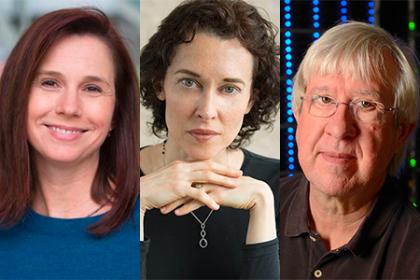Three Johns Hopkins University researchers—neuroscientist Amy Bastian, biomedical engineer Jennifer Elisseeff, and astrophysicist and computer scientist Alex Szalay—have been elected to the National Academy of Sciences in recognition of their distinguished and continuing achievements in original research.

Image caption: Amy Bastian, Jennifer Elisseeff, and Alex Szalay
Bastian, Elisseeff, and Szalay are among 120 members and 23 international members elected this year, the academy announced Tuesday. With the new elections, the total number of active academy members grows to 2,565 and the total number of international members—nonvoting members with citizenship outside the U.S.—grows to 526. A full list of new members elected in 2023 can be found on the National Academy of Sciences website.
Bastian combines her expertise in neuroscience and physical therapy to study human movement. Specifically, she has a focus on the effects of disease and damage to the central nervous system on movement in adults and children, as well as how people learn new patterns of movement. Bastian is the chief scientific officer and director of the Center for Movement Studies at the Kennedy Krieger Institute; she is also professor of neuroscience, neurology, and physical medicine and rehabilitation at the Johns Hopkins University School of Medicine. She joined Johns Hopkins and Kennedy Krieger in 2001 from the Washington University School of Medicine in St. Louis.
Elisseef specializes in regenerative medicine, especially using the body's own immune system as an avenue for tissue repair and regeneration. She directs the Translational Tissue Engineering Center, a joint venture between the Wilmer Eye Institute and the university's Department of Biomedical Engineering, and is a professor of biomedical engineering, ophthalmology, materials science and engineering, and chemical and biomolecular engineering. Elisseeff joined Hopkins in 2001 after completing a fellowship at the National Institute of General Medical Sciences. She was previously elected to the National Academy of Engineering, the National Academy of Medicine, and the American Academy of Arts and Sciences, and she received the prestigious NIH Director's Pioneer Award in 2019.
Szalay is an international leader in astronomy, cosmology, the science of big data, and data‐intensive computing who has significantly expanded our understanding of the structure formation and nature of dark matter in the universe. He has also led the development of computer architectures that are creating a new paradigm of data-intensive science across multiple fields, including astronomy, radiation oncology, and genomics. Szalay is a Bloomberg Distinguished Professor with appointments in JHU's Krieger School of Arts and Sciences and Whiting School of Engineering, and he directs the Institute for Data Intensive Engineering and Science. He joined Johns Hopkins in 1989 from Eötvös University in Hungary and is a fellow of the American Academy of Arts and Sciences.
The National Academy of Sciences is a private, nonprofit institution that was established under a congressional charter signed by President Abraham Lincoln in 1863. It recognizes achievement in science by election to membership, and—with the National Academy of Engineering and the National Academy of Medicine—provides science, engineering, and health policy advice to the federal government and other organizations.
Posted in University News
Tagged jennifer elisseeff, alex szalay, national academy of sciences







